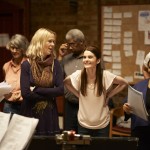Many films aimed at male audiences are revenge thrillers where the revenge is violent and the tone is deadly serious. The Other Woman is a female revenge comedy that has some bloody noses but is otherwise gags and farce.
The premise – a 40-something wife and two sexy mistresses exact revenge on a serial cheater – has the making of a classic comedy, particularly when the women are ‘Queen of comedy’ Leslie Mann (Funny People, This is 40), Cameron Diaz (Bad Teacher, There’s Something about Mary) and Sports Illustrated model/actress Kate Upton.
Director Nick Cassavetes (son of Gena Rowlands and John Cassavetes) keeps up a lively pace, but Melisa K Stark’s script uses vulgarity rather than classy humour to rehash more successful films of the genre.
High-powered lawyer Carly (Diaz) has put her career first, and pushing 40, has all but given up hope of finding Mr Right. That explains why, two months after romantic, handsome, and well-off businessman, Mark King (Nikolaj Coster-Waldau, TV’s Game of Thrones, Head Hunters) enters her life, Carly arranges for him to meet her bruiser father (Don Johnson).
When Mark calls with an excuse about a burst pipe, alarm bells ring. On her father’s advice, Carly drives out to Mark’s off-limits suburban home dressed like a plumber at a Halloween bondage party.
When a pretty, 40-something woman answers the door, identifying herself as Mark’s wife, Kate (Leslie Mann), the shock and animosity is mutual.
Despite their differences, Kate and Carly soon realise that their mutual interest in exacting revenge binds them together. Kate’s emotional immaturity and neediness is a turn-off, but under Carly’s influence, Kate transforms into the super clever, feisty, independent woman that had been suffocated by her suburban housewife guise.
Meanwhile, Mark, left with a suspicious wife and angry mistress, has wasted no time finding Amber (Kate Upton) a pin-up girl half their age to fill the void.
The film, shot in Manhattan with lovely beach scenes in the Hamptons, looks great, and the contrasts between the three women, particularly their sizes, hair, make-up and how they dress are carefully thought out to differentiate their professional status, age and personalities.
There’s no doubt, however, that the moment Amber enters the story it grinds to a halt not only because Kate Upton has no discernible comedic skills, but because her character ads nothing to the story but impressive measurements.
Mann and Diaz complement one another and, plot-wise, are sufficient to convey the film’s women’s liberation message that so obviously hovers around Kate’s character.
In addition to the 1996 comedy, the First Wives Club, in which three women plot revenge on their two-timing husbands, The Other Woman is a pale copy of (amongst others) two Bette Midler comedies that, unlike The Other Woman, really make you laugh.
In Outrageous Fortune two rival actresses track down a cheater to force him to choose between them, and in the even funnier Ruthless People, a kidnapped housewife plots revenge on her wealthy, two-timing husband when he refuses to pay the ransom.
The scatological nature of the revenge itself is unpleasant and also unnecessary when the women, who have discovered Mark’s dishonest business ventures, can attack him where it really hurts.
Even here, though, Mark isn’t given the chance to put his conman skills to good use against the plot and, unsuspecting to the end, proves an easy target for the women. In the wonderful dark comedy Head Hunters, Nikolaj Coster-Waldau’s plays a far more adept adversary.
Joyce Glasser – MT film reviewer




